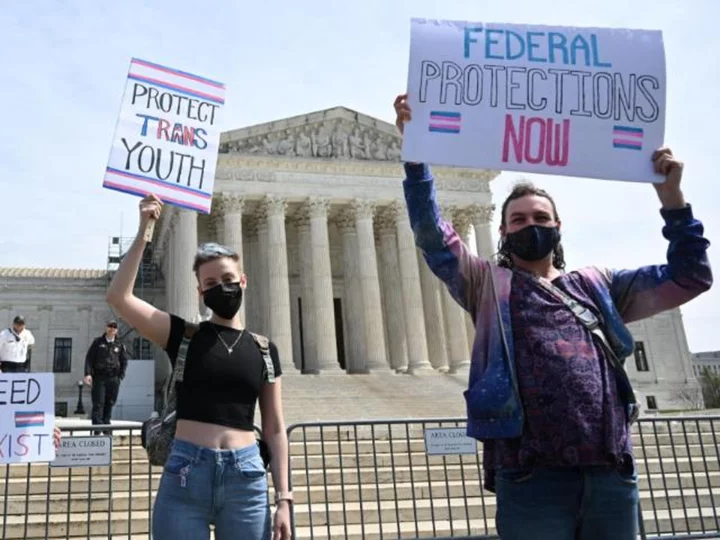
New York official was bribed and let chicken contaminated with metal be served in school lunches, jury finds
A top official overseeing school lunches in New York City’s sprawling public school system took bribes and allowed dangerous chicken products contaminated with shards of metal and plastic to be served to children, a jury concluded on Wednesday. Eric Goldstein, who oversaw the city’s Office of Food and Nutrition Services, was convicted in a Brooklyn court of conspiracy, extortion, wire fraud, and taking bribes. Prosecutors said he was bribed with cash and an ownership stake in a food company by the owners of food supply company Somma – Blaine Iler, Michael Turley, Brian Twomey – in exchange for his cooperation facilitating lucrative contracts with the city. The trio of men were convicted of conspiracy, wire fraud, and bribery. “Eric Goldstein was for sale,” prosecutor Laura Zuckerwise said in her closing statemnets. “And Michael Turley, Blaine Iler and Brian Twomey, they bought him.” Goldstein could face up to 20 years in prison, according to The New York Post. The former school official, who previously started a food company of his own alongside Turley, Iler, and Twomey called Range Meats Supply, helped fast-track Somma to get contracts supply nearly 2,000 schools in 2015, leading to a huge spike in demand and millions of dollars of food orders. “I’m going to buy a lot of f***ing chicken from you guys, let’s do the beef,” Goldstein allegedly told Iler at a 2015 meeting, according to prosecutors. By September of 2016, people were complaining that Somma chicken contained pieces of wire-like metal and plastic, according to school incident logs shown to jurors. The chicken caused people to bleed and in one case choke on a bone in a supposedly boneless dish, according to officials. As complaints mounted, Turley, Iler, and Twomey allegedly offered Goldstein ownership of Range Meats and $66,000. The trio also sent money to Goldstein’s divorce lawyer and took the school official on trips around the world. The group used the code name “Roger Rabbit” to refer to Goldstein, according to law enforcement. During the trial, prosecutors showed jurors emails between the now-convicted conspirators, and showed photos of one of the tainted drumsticks, which had a bright red liquid oozing out of it. A lawyer for Goldstein told The New York Times has was “extremely disappointed” and would appeal the verdict.
1970-01-01 08:00

Supreme Court allows transgender woman's lawsuit against Virginia prison to continue
The Supreme Court on Friday cleared the way for an individual who suffers from gender dysphoria to sue a Virginia men's prison for violating a federal law that prohibits discrimination based on disability.
1970-01-01 08:00

NBA Rumors: Lakers linked to 2 sleepers in free agency
The Lakers are reportedly interested in signing two specific veteran free agents who will most likely end up getting minimum contracts in Los Angeles.According to Jovan Buha of The Athletic, the Lakers have two veteran targets going into free agency: Cam Reddish and Yuta Watanabe.The Lakers ...
1970-01-01 08:00

Boost for Wagner as Mali shuns UN troops, but at what cost?
As it pushes out 12,000 UN peacekeepers, Mali will be relying ever more heavily on Russian mercenaries.
1970-01-01 08:00

Ron DeSantis and Jesse Watters Ate Pizza on FOX News
VIDEO: Ron DeSantis and Jesse Watters love pizza.
1970-01-01 08:00

‘It’s hard on our family’: For these lawmakers with trans children, Republican attacks are personal
In 2019, for the first time, Pramila Jayapal shared with members of Congress the joy of her then-22-year-old child’s “newfound freedom” embracing their gender identity. “My child is finally free to be who they are,” she wrote after a hearing. “With that freedom comes a responsibility, for us as legislators, to legislate with love and not fear.” Four years later, when her House colleagues introduced legislation to ban transgender women and girls from sports consistent with their gender, the congresswoman – the “proud mom of a trans kid” – shared the pain she felt against a wave of similar bills and the hateful rhetoric fuelling them. “I know that when my daughter came out it was not an easy process,” she said. “What she continues to see around her, and from politicians, unfortunately, is a condemning of who she is. We cannot allow that to happen.” Ms Jayapal is among parents in Congress and in state legislatures across the country combatting legislation to define the sports their children can play as themselves; the bathrooms, names or pronouns they can use; and what medically recommended and potentially life-saving medical care they can receive. “It’s really hard. It’s hard on our family, it’s hard on my daughter to see this – I think she has the comfort of community around her, that supports her, including her very fierce mother,” Ms Jayapal tells The Independent. “I have people, parents, and kids who come up to me … who just ask if they can hug me and start crying,” she says. “Grown men, women and kids and people who just are really fearing for their safety and for their future.” One of the most prominent voices against sweeping legislation targeting LGBT+ people in Kentucky is Karen Berg, a state senator whose transgender son Henry died by suicide in late December. In Nebraska, where the state’s unicameral legislature is the smallest in the country, with a small body of lawmakers who know one another intimately, state Senator Megan Hunt joined an epic filibuster to combat anti-trans legislation that would impact her 13-year-old trans son. US Rep Katherine Clark, the Democratic Whip in the House of Representatives, has endured ongoing right-wing media scrutiny and social media harassment involving her trans daughter Riley. Now-former US Rep Marie Newman, whose daughter is trans, mounted a trans pride flag outside her office after far-right congresswoman Marjorie Taylor Greene unleashed a vitriolic string of transphobic statements. Parents first, these lawmakers and others have centred the experience of their children and the lives of other trans and nonbinary Americans in their testimony and advocacy, reclaiming the so-called “parents’ rights” movement that has sought to remove trans stories from public life altogether. “I’m not gonna lie – I get really hot under the collar,” Ms Jayapal says. “And I try to control myself. But it is personal. And it is also collective. It’s both. And I see over and over again, that people across the country are just disgusted and shocked and saddened by what this Republican Party has resorted to.” LGBT+ Americans want to live “their full, authentic selves, and they want to be able to access all the same services that everyone wants,” she says. “I’m never gonna stop fighting for them. And they can count on me to be there and to stand up for them and to push back and push forward.” A new wave of vitriol and ‘baffling’ legislation In 2016, the day after Donald Trump’s presidential victory, Marie Newman decided to run for Congress. Her daughter, Evie, began transitioning two years earlier. Her fears of a coming tide of legislation targeting LGBT+ Americans, emboldened by the incoming administration, compelled her mother to run for office. “The day after Trump was elected my daughter came downstairs and said, ‘Mom, am I going to be safe?’” Ms Newman tells The Independent from her office in Chicago. In the years after Trump’s election and Ms Newman’s two years in Congress, lawmakers across the country introduced a record number of bills targeting LGBT+ Americans as Republican officials weaponise anti-trans attacks for 2024 campaigns. “It’s baffling to me,” Ms Newman says. “They’re effectively creating a problem where there is nothing. They’ve created this weird and creepy solution for a zero problem.” By the end of May, state lawmakers had introduced more than 500 bills impacting LGBT+ people in 2023, including 220 bills specifically targeting trans and nonbinary Americans, according to an analysis from the Human Rights Campaign. Republican members of Congress have also introduced federal legislation that mirrors some of the proposals dominating state capitols. One measure would impose national restrictions on trans athletes, and another bill would impose a similar but more-expansive version of what critics have called state-level “Don’t Say Gay” bills used to restrict classroom discussion of LGBT+ people and events. Opponents of so-called “Don’t Say Gay” laws have sparked fears that their broad scopes could effectively block discussion of LGBT+ people, history and events from state schools, and be weaponised against students, staff and their families under threat from potential lawsuits against school districts over perceived violations. A federal version backed by more than 30 House Republicans would ban institutions that receive federal funds from hosting “sexually oriented” discussion, materials and events where children could be present. Democratic members of Congress, meanwhile, have repeatedly introduced the Equality Act, which would amend the landmark Civil Rights Act of 1964 to add federal protections from discrimination on the basis of sexual orientation and gender identity. The measure, which has the support of President Joe Biden, has been introduced five times in both chambers of Congress since 2015. In her remarks to the House in 2021 in support of the legislation, Ms Newman said she recognised that from the moment her daughter came out as trans, she “would be living in a nation, where in most of its states, she would be discriminated against merely because [of] who she is.” “And yet it was the happiest day of my life, and my daughter has found her authentic self,” she said. Far-right US Rep Marjorie Taylor Greene of Georgia, among the most noxious voices against LGBT+ rights in Congress, has called the Equality Act “disgusting,” “immoral” and “evil”. Following Ms Newman’s testimony, she intentionally misgendered the lawmaker’s daughter. Ms Newman, whose office was located directly across the hall from Ms Greene’s, responded by hoisting a trans pride flag outside her door. Ms Greene replied with a poster outside her office reading: “There are TWO genders: Male & Female. Trust The Science!” Ms Newman says she couldn’t care less what kinds of posters Ms Greene hangs outside her office, but “what we can’t have is lawmakers going after one another’s families – that is not acceptable.” “The vitriol is unabashed now. We see lawmakers going after one another in the hallways in their offices, and they’re on the floor, everywhere and then creating rallies – hate rallies,” Ms Newman tells The Independent. “I’m worried about democracy, and I’m worried about our level of ability to live with one another. It’s alarming.” ‘Their platform is hate’ Nebraska has a population of fewer than 2 million people. It is also the smallest legislature in the country, with only 49 members. All of state senator Megan Hunt’s colleagues have met her child. Many of them have babysat for Ms Hunt or travelled with her family for legislative work. “Many of you have helped me take care of him,” she told lawmakers earlier this year as they considered legislation to outlaw gender-affirming healthcare for trans youth. “And this bill, colleagues, is such an affront to me, personally, and would violate my rights to parent my child in Nebraska. And I just want to tell you that. I want to stop letting that go unsaid, actually,” she said. Her viral remarks dropped the facade of performative “civility” in legislative debates across the country, underscoring the attacks against her own family coming from members of a small body of lawmakers that she has known for years. Much of that legislation has been drawn from a handful of conservative Christian special interest groups and right-wing lobbyists, working in tandem with state lawmakers to introduce nearly identical bills across the US. The debates surrounding trans care are “totally cooked up to divide us, to put divisions in our country, and they don’t even reflect what most people care about,” Ms Hunt told The Independent earlier this year. “These groups have a long history of using religion to justify discrimination and marginalization,” she said. “It’s always about finding another scapegoat. And who could be a better scapegoat than children. They don’t have a lobby, they don’t have a lot of money, they are not fighting for themselves as much as other groups are. And for me, it’s just too far. … I didn’t run for office to do this bull****.” Ms Hunt was the subject of a complaint to Nebraska’s Accountability and Disclosure Commission filed by a right-wing activist lawyer, who alleged that, because her son is trans, her opposition to legislation potentially impacting his healthcare is a conflict of interest. The complaint was condemned by lawmakers from both parties. “They can punish me any way they want to. But when we’re talking about human rights, we’re talking about trans rights. That’s not a partisan issue. It’s not a political issue. It’s about standing up in the face of blatant discrimination against an entire group of people,” she told The Independent. “And there’s only one right answer, which is to not legislate hate against other people.” Kentucky state Senator Karen Berg did not intend to run on a platform around LGBT+ rights, nor did she predict a fever in state capitols to dismantle them. “I never thought, ‘Oh, my God, we’re gonna take two steps forward, and then 100 years back’,” she tells The Independent from her home in Kentucky. “I did not see it.” Henry Berg-Brousseau – her 24-year-old son and a press secretary for the Human Rights Campaign, the nation’s largest LGBT+ civil rights organisation – did. “He had known and he was telling me this was coming for a year and a half or more, maybe. He was dreading the state session,” she tells The Independent. Henry died by suicide on 16 December. After her son’s death, Ms Berg prepared for the eight-week legislative session ahead of her, as Republican lawmakers in the state prepared what opponents have labeled as one of the most far-reaching anti-trans laws in the nation. On 28 June, a federal judge struck down parts of the law that ban affirming healthcare, among a string of recent federal court decisions that have tossed out or temporarily blocked gender-affirming care bans in several states. Ms Berg sees the fight for LGBT+ rights in state legislatures as part of a broader anti-democratic threat from a Republican Party that is “trying to divide us because they think it is the only way to win at this point”. “Their agenda and their policy and their platform is hate,” Ms Newman says. That agenda thrives, in part, within a feedback loop of well-funded special interest groups and political action committees relying on candidates’ anti-trans rhetoric, she says. ‘A focal point for hope’ In remarks on the House floor to recognise Trans Day of Visibility on 31 March, US Rep Katherine Clark of Massachusetts stood to honour “trans joy that deserves to be celebrated – not eradicated,” sharing her “unconditional love” for her trans daughter. “I rise in solidarity with every trans American seeking nothing less than their inalienable right to the pursuit of happiness,” she added. “To stand in the way of that right is to stand against our most basic American values, but that’s exactly what MAGA extremists are doing across this country,” said Ms Clarke, condemning the “especially vicious crusade on our kids.” In response to those attacks, Ms Jayapal has introduced a Trans Bill of Rights, an ambitious policy framework for federal protections for trans and nonbinary people. “We needed a positive vision,” she tells The Independent. “Obviously the Equality Act is a big part of that, but something that really centered trans people in particular.” The proposal, supported by dozens of civil rights organizations and drafted with input from trans rights groups, outlines a series of federal government protections against discrimination in all aspects of public life, including housing, education and healthcare. A Trans Bill of Rights is unlikely to advance in Congress, but it has served as an instructive organising tool among advocates and lawmakers to illustrate the chasm between current protections and unrealized demands. “Every time I talk about it, it becomes a focal point for hope,” Ms Jayapal says. “And for a sense of justice to continue to prevail, that we know what we’re striving for – even if we’re having to fight all this opposition and cruelty right now.” The flood of anti-trans bills and the political debates surrounding them have also negatively impacted the mental health of an overwhelming majority of young trans and nonbinary people, according to polling from The Trevor Project and Morning Consult. Two-thirds of young LGBT+ people reported that political debates surrounding their identities have made their mental health worse. Such stark disparities and the concurrent legal battles surrounding trans rights throughout Pride Month have underscored the need to recognise the “healing and the hurt” in those celebrations, Ms Jayapal says. Much of that can start at home, according to LGBT+ advocates. Fewer than 40 per cent of LGBT+ youth found their home to be affirming, according to The Trevor Project. Trans and nonbinary youth living in homes where their pronouns are respected reported lower rates of attempting suicide. Ms Jayapal often speaks with parents who ask her how she came to understand what her daughter experienced, helping to alleviate a tension among some families that are unsure how to correctly respond to their child’s identity. “You don’t have to know everything upfront, and you don’t have to be afraid of making a mistake with language or not being fully aware or educated on even what the process of transitioning looks like,” Ms Jayapal says. “You can learn all of that. The most important thing is that your child feels like you are there for them, that you’re willing to learn and that you’re supportive, that she or he is the same person they’ve always been.” If you are based in the US and seek LGBT+ affirming mental health support, resources are available from Trans Lifeline (877-565-8860) and the LGBT Hotline (888-843-4564), as well as The Trevor Project (866-488-7386, or text START to 678-678). If you are experiencing feelings of distress, or are struggling to cope, you can speak to the Samaritans, in confidence, on 116 123 (UK and ROI), email jo@samaritans.org, or visit the Samaritans website to find details of your nearest branch. If you are based in the US, and you or someone you know needs mental health assistance right now, call or text the 988 Suicide & Crisis Lifeline at 988. This is a free, confidential crisis hotline that is available to everyone 24 hours a day, seven days a week. If you are in another country, you can go to www.befrienders.org to find a helpline near you. Read More She lost her transgender son to suicide. She isn’t giving up fighting for him Pioneering transgender lawmaker has advice for pushing back against transphobic bills Ritchie Torres, the only openly gay Black man in Congress, on how he fights GOP ‘bullying’ of LGBT+ people
1970-01-01 08:00

Travel in America is a crapshoot, and it won't get better anytime soon
Hundreds of thousands of people who expected to travel this week found themselves frustratingly stationary — stuck in an airport, far from home, with few good options but to wait. And wait.
1970-01-01 08:00

Supreme Court strikes down Biden’s plan to cancel student loan debts
The US Supreme Court has struck down President Joe Biden’s plan to cancel student loan debts for millions of Americans, reversing his campaign-trail promise as borrowers prepare to resume payments this summer. Chief Justice John Roberts delivered the 6-3 decision from the court’s conservative majority. The ruling, which stems from a pair of cases challenging the Biden administration and the US Department of Education, argues that the president does not have authority to implement sweeping relief, and that Congress never authorised the administration to do so. Within 30 minutes on the last day of its term, the court upended protections for LGBT+ people and blocked the president from a long-held promise to cancel student loan balances amid a ballooning debt crisis impacting millions of Americans. Under the plan unveiled last year, millions of people who took out federally backed student loans would be eligible for up to $20,000 in relief. Borrowers earning up to $125,000, or $250,000 for married couples, would be eligible for up to $10,000 of their federal student loans to be wiped out. Those borrowers would be eligible to receive up to $20,000 in relief if they received Pell grants. Roughly 43 million federal student loan borrowers would be eligible for that relief, including 20 million people who stand to have their debts canceled completely, according to the White House. Roughly 16 million already submitted their applications and received approval for debt cancellation last year, according to the Biden administration. The long-anticipated plan for debt cancellation was met almost immediately with litigation threats from conservative legal groups and Republican officials, arguing that the executive branch does not have authority to broadly cancel such debt. Six GOP-led states sued the Biden administration to stop the plan altogether, and a federal appeals court temporarily blocked any such relief as the legal challenges played out. Since March 2020, with congressional passage of the Cares Act, monthly payments on student loan debt have been frozen with interest rates set at zero per cent. That Covid-19-pandemic era moratorium, first enacted under Donald Trump and extended several times, was paused a final time late last year – until the Education Department is allowed to cancel debts under the Biden plan, or until the litigation is resolved, but no later than 30 June. Payments would then resume 60 days later. The amount of debt taken out to support student loans for higher education costs has surged within the last decade, alongside growing tuition costs, increased private university enrollment, stagnant wages and GOP-led governments stripping investments in higher education and aid, putting the burden of college costs largely on students and their families. The crisis has exploded to a total balance of nearly $2 trillion, mostly wrapped up in federal loans. Millions of Americans also continue to tackle accrued interest without being able to chip away at their principal balances, even years after graduating, or have been forced to leave their colleges or universities without obtaining a degree at all while still facing loan repayments. Borrowers also have been trapped by predatory lending schemes with for-profit institutions and sky-high interest rates that have made it impossible for many borrowers to make any progress toward paying off their debt, with interest adding to balances that exceed the original loan. One analysis from the Education Department found that nearly 90 per cent of student loan relief would support people earning less than $75,000 per year. The median income of households with student loan balances is $76,400, while 7 per cent of borrowers are below the poverty line. That debt burden also falls disproportionately on Black borrowers and women. Black college graduates have an average of $52,000 in student loan debt and owe an average of $25,000 more than white graduates, according to the Education Data Initiative. Four years after graduating, Black student loan borrowers owe an average of 188 per cent more than white graduates. Women borrowers hold roughly two-thirds of all student loan debt, according to the American Association of University Women. Mr Biden’s announcement fulfilled a campaign-trail pledge to wipe out $10,000 in student loan debt per borrower if elected, though debt relief advocates and progressive lawmakers have urged him to cancel all debts and reject means-testing barriers in broad relief measures. In November 2020, the president called on Congress to “immediately” provide some relief for millions of borrowers saddled by growing debt. “[Student debt is] holding people up,” he said at the time. “They’re in real trouble. They’re having to make choices between paying their student loan and paying the rent.” This is a developing story Read More Supreme Court allows Colorado designer to deny LGBT+ customers in ruling on last day of Pride Month Biden condemns Supreme Court striking down affirmative action: ‘This is not a normal court’ Justice Ketanji Brown Jackson delivers searing civil rights lesson in dissent to affirmative action ruling
1970-01-01 08:00

Sparks vs. Sky prediction and odds for Friday, June 30 (How to bet total)
The Chicago Sky snapped a lengthy losing streak with a win over the Los Angeles Sparks on Wednesday night, and the two teams will face off again on Friday in Chicago.Los Angeles’ offense has been struggling with the loss of Lexie Brown (illness) – the team’s third-leading score...
1970-01-01 08:00

Nearly Half of Americans Are Ready to Ditch Fully Gas-Powered Cars
The electric vehicle revolution is accelerating, with more Americans than ever looking to move away
1970-01-01 08:00

Sarah Jessica Parker doesn't like to look at herself
Sarah Jessica Parker sounds like she is no great fan of mirrors.
1970-01-01 08:00

Melania Trump hawks $50 NFTs to ‘celebrate our great nation’ ahead of July 4
Melania Trump is launching a collection of $50 non-fungible tokens (NFTs) featuring US landmarks in time for the 4th of July. The former first lady’s “1776 Collection” includes images of Mount Rushmore, the Statue of Liberty and the Liberty Bell, set to patriotic-themed music. Ms Trump’s office said in a statement that each NFT was designed to celebrate the “foundations of American ideals”. “The 1776 Collection of artwork draws inspiration from several iconic landmarks of our nation, which I had the privilege of visiting during the time I served as first lady,” Ms Trump said. “I am proud to celebrate our great nation and remain inspired by the words contained within the Declaration of Independence.” An NFT is a blockchain-based certificate verifying ownership. The 1776 Collection was created on the Solana blockchain, and went on sale on Thursday. Ms Trump’s office said a portion of the sale price would go to support foster children. The site did not immediately respond to a request for further details about what percentage of the proceeds would be donated. Ms Trump has previously dabbled in NFTs since leaving the White House. In 2021, she launched a digital watercolour painting of her eyes for $180 each. Then in 2022, Ms Trump faced accusations of bidding $185,000 in an auction for her “Head of State Collection 2022.” An analysis of Solana blockchain transactions by Bloomberg found the winning bid of 1800 SOL came from a wallet that belonged to the entity that originally listed the project for sale. Read More Trump news - live: DOJ prepares to hit Trump with new charges as ex-official cooperates in 2020 election probe Trump lashes out at ‘fake’ Jake Tapper after CNN host cuts away from arraigned ex-president meeting fans Meet Jesse Watters, the Fox News host helming Tucker Carlson’s primetime slot Prosecutors are prepared to hit Trump and his allies with new charges, sources say
1970-01-01 08:00
